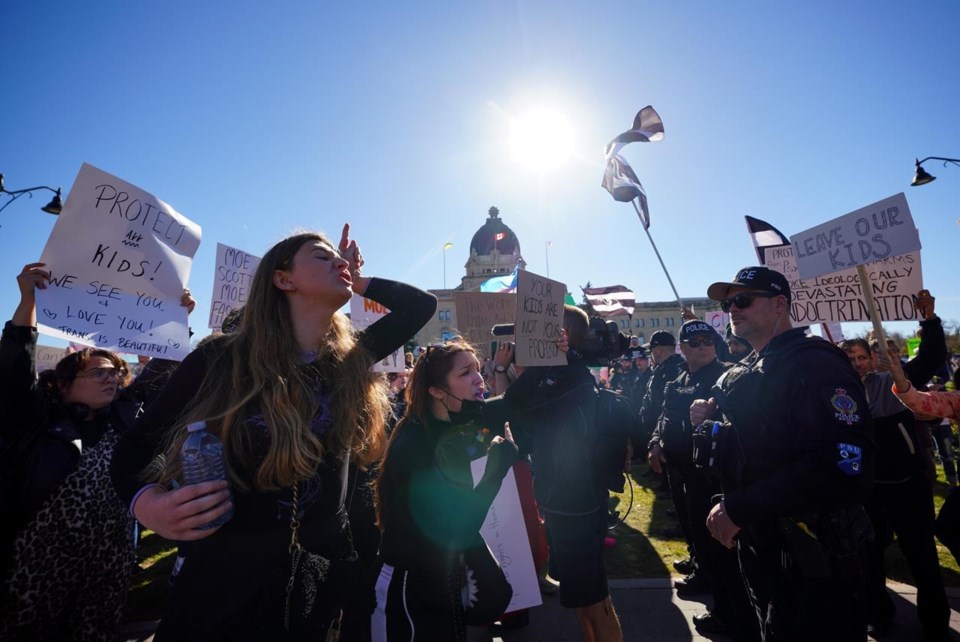REGINA — On the day politicians returned to debate legislation over the Saskatchewan Party government's pronoun policy in schools, Memphis Hartman reminded people he's a human being.
The 17-year-old student, who is transgender, told hundreds at a rally outside the legislature he's grateful he received support from his family and teachers.
"Trans people have existed and they will continue to exist in your classroom, whether you use their name or not," Hartman told the crowd.
Politicians returned to the legislature Tuesday ahead of the rally, with the government prepared to legislate a policy that would require children under 16 to receive parental consent if they want to change their names or pronouns at school.
However, the government has to wait until at least Thursday to introduce the legislation, known as Bill 137, the Parents Bill of Rights Act.
Legislature protocol prevented the government from introducing the legislation Tuesday, as it's required to provide two days' notice.
Premier Scott Moe said he could not offer details on the bill but that he plans to invoke the notwithstanding clause, a provision that allows governments to override certain Charter rights for five years.
"We've been clear about that from the very beginning from the introduction of this policy and ultimately now the introduction of this legislation and the requirement of utilizing the notwithstanding clause to ensure that the policy is in place," Moe told reporters.
"With respect to the use of notwithstanding clause itself, that is part of the Charter, and it was put in place so that elected members in the future would be able to determine which of those rights, ultimately, would be in place."
A judge granted an injunction at the end of September, pausing the policy before a constitutional challenge is heard later this year.
Moe called the judge's decision "judicial overreach."
"I think, you know, using the words like irreparable harm were not necessarily present in some of those school divisions where a very similar policy was already in place," he said.
Opposition NDP Leader Carla Beck said the party plans to fully scrutinize the legislation.
"There are a lot of issues in this province right now that are top of mind for people," Beck said. "There are also a lot of people who want to see the official Opposition acknowledge that, while it may be a small group, there is a small group in this province ... that this government is targeting and putting at risk."
During the rally, many waved Pride flags and held signs calling on the premier to protect human and transgender rights.
Others were there to support parents' rights.
At one point, people on both sides shouted at each other: “Leave our kids alone” and “love not hate.”
Hartman said he felt overwhelmed by the support from those who rallied, but that he's also saddened.
"The reasons why we have to gather like this are deplorable," Hartman said.
"If my parents hadn't been supportive, I would have had my school to fall back on before this legislation. To imagine trans brothers and sisters going through that without that cushion is a nightmare."
Hartman's father, Robert Hartman, said he's proud his son spoke at the rally.
He said he chose to support his son when he came out.
"I know (parents) are afraid," he said. "There are so many 'what-if' questions that we struggle with as parents, and there's so much fear. But I would encourage people to not let fear blind you from basic logical thinking.
"For us to educate kids and have sexual education in school, to educate them on tolerance and that there are different people out there, is not going to make them make a decision that's contrary to who they are."
One demonstrator, Alejandra Cabrera, said she believes Moe is overreaching.
“I think he’s drunk with power,” Cabrera said. “He's making this a political issue when it's a human rights issue.”
Larry Rousseau, executive vice-president with the Canadian Labour Congress, said the Charter is meant to protect the rights of everyone, including minorities.
“We must understand that there are children out there who do not feel safe, who feel that maybe they might be able to trust a teacher or someone at school, but not be able to have that discussion at home,” he said.
“Parents have rights, absolutely, but so do children.”
Tonie Wells said her group supports the premier’s use of the notwithstanding clause.
“We feel that it was an overreach by the judge to put an injunction. This is about our kids,” Wells said. “And this is about allowing our children to naturally develop and actually develop who they want to be.”
Lawyers for UR Pride sought the injunction, arguing the policy could cause teachers to out or misgender children and that it violates Charter rights. Saskatchewan's child advocate Lisa Broda has also said it violates rights to gender identity and expression.
Moe has said the policy has strong support from the majority of Saskatchewan residents and parents.
This report by The Canadian Press was first published Oct. 10, 2023.
Jeremy Simes, The Canadian Press



